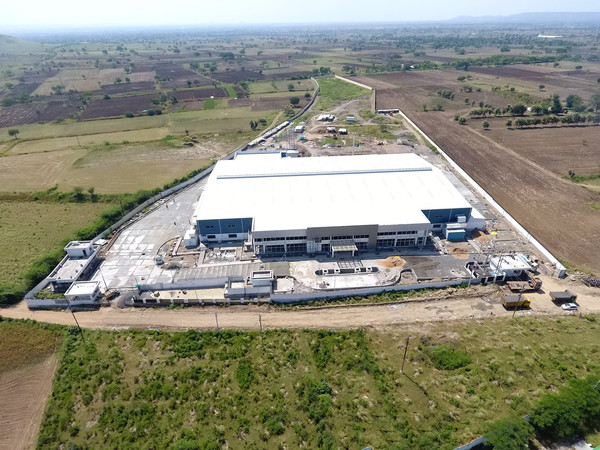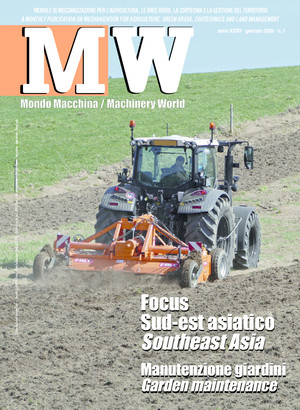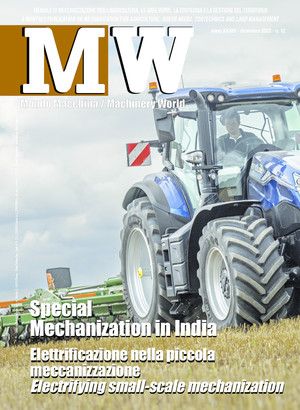
CBM-Mita: a high tech factory is launched in Dewas
The countdown has begun for the inauguration of CBM's manufacturing facility in Dewas, which will enable the Modena company to further expand its production. The site, located in a strategic area for logistics, was created with the most modern construction technologies and the most innovative equipment
There are just a few weeks to go before the inauguration of the second CBM Group plant in India. The opening of the production plant, managed by the Modena company through its subsidiary Mita India, is scheduled for January or at the latest February 2018, when production of the first components will start: hydraulic and electronic lifts, distributors, hydraulic valves and three point hitches. It gives shape to one of the most significant investments made by the Emilia company in recent years. On the eve of this important event, Mondo Macchina interviewed Enrico Cornia, Managing Director of CBM, to focus on the group’s potentialities and development strategies in the Indian subcontinent.
Your group has been present in India since 2000, when the Ghaziabad plant near Delhi became operational. Then, in 2014, you decided to open a second one in the State of Madhia Pradesh, in Dewas, one thousand kilometres to the South. What are the objectives of your company with the new production site and what synergies have you planned between the two production units?
Ghaziabad’s manufacturing site, specializing in the production of lifters and three-point hitches, has now reached its maximum production capacity. The new plant in Madhia Pradesh has become necessary to allow us to further expand our offer not only on the Indian market, where we generate significant figures, but also abroad, in North America, Europe and Turkey. Furthermore, the Dewas plant has been designed with all the latest technology and will allow us to offer very innovative and ever-increasing quality components.
The Madhia Pradesh structure covers a surface of 40 thousand square metres, representing a state-of-the-art facility from a constructive and organizational point of view...
The plant is located in a city of 230 thousand inhabitants, close to the most populous centre of Indore, where about 2 million people live. It is a strategic area for logistics, on the Delhi-Pune highway, which is seeing a growing industrial presence. And among the companies that are settling in the area there is also one of our main customers, with whom we could activate a door-to-door supply channel. From a constructive point of view, the Dewas site offers the most innovative production facilities, including, for example, robotic washing systems, test benches with continuous oil flush for contaminants, and assembly lines made according to lean manufacturing principles.
After eighteen years, the CBM Group ups the stakes in India with a new investment, a sign that it sees great potential in this country. How is the Indian market developing and what shape will it take in the medium and long term?
It is a market that undoubtedly offers great potential. Today the tractor market counts about 600,000 units, most of which are in the low-medium power classes, ranging from 30 to 50 horsepower. According to our forecasts, this situation is likely to change in the coming years with a gradual increase in power, pushing demand for product technology more similar to that in Europe. In such a context, the ability to innovate will increasingly be a key factor in order to be competitive, also in the Indian subcontinent.
Establishing a production site in a country like India is also a challenge in terms of organization and human resources. How many units will be used at the plant and what professional profiles have you searched for locally?
We will start with a hundred people, reaching three hundred at full productive capacity. We trained local staff in Ghaziabad, because in Dewas, which does not have a consolidated industrial tradition, it is difficult to find specialized labour. For the most important technical figures we turned to the nearby University of Indore. The Research & Development functions, linked to design and testing will, however, continue to be performed at our headquarters in Italy.
The CBM Group focuses on India
Group has been active in Modena’s manufacturing environment since the late 1960s, when founder Omero Cornia and his wife Paola Bergamini understood that the three-point hitch system would soon become a key component of tractors. At the time, the newborn CBM found itself operating in a market segment with great possibilities for development, succeeding in establishing important partnerships with some of the major Italian manufacturers of agricultural machinery. The first commissioned components were followed by an actual “CBM range”. On this basis, the Emilian company began to diversify production, first by acquiring Mita Oleodinamica, followed by the creation of the subsidiary Mita India Pvt. Ltd, then Tetra Acciai specialized in heat treatment of alloy and special steels. 2007 saw the establishment of CBM Polska, with which the group reached its current structure. Within this industrial group, the CBM head company maintained its strong specialization in front and rear three-point hitches for tractors with a power range of 20 to 450 horsepower. In the Indian subcontinent, the group is present through its subsidiary Mita India, with the Ghaziabad plant, founded in 2000, and with a second major plant that will soon be inaugurated in Dewas, about a thousand kilometres south of Delhi. The first Indian plant produces three-point hitches and tractor lifters with power ranging from 20 to 60 Hp. The second site will also be dedicated to the production of three-point hitches and lifters, as well as other types of product, and it will have a major employment impact, enabling the Modena group to further strengthen its presence on a constantly expanding market such as India, and on all the international markets that require CBM technologies.








